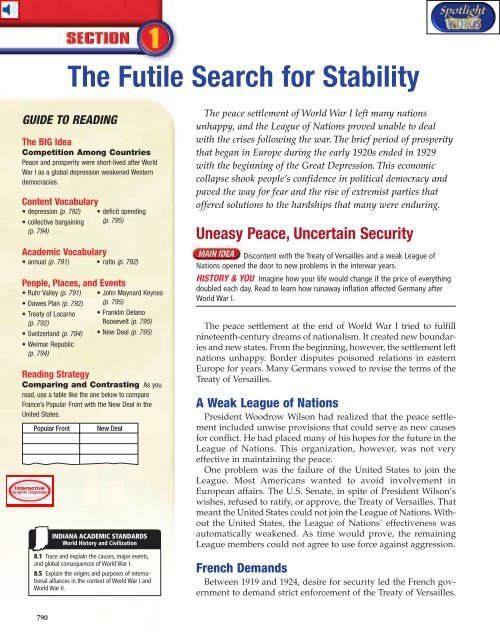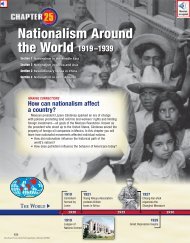Chapter 24: The West Between the Wars, 1919-1939 - APAblog.org
Chapter 24: The West Between the Wars, 1919-1939 - APAblog.org
Chapter 24: The West Between the Wars, 1919-1939 - APAblog.org
You also want an ePaper? Increase the reach of your titles
YUMPU automatically turns print PDFs into web optimized ePapers that Google loves.
<strong>The</strong> Futile Search for Stability<br />
GUIDE TO READING<br />
<strong>The</strong> BIG Idea<br />
Competition Among Countries<br />
Peace and prosperity were short-lived after World<br />
War I as a global depression weakened <strong>West</strong>ern<br />
democracies.<br />
Content Vocabulary<br />
• depression (p. 792)<br />
• collective bargaining<br />
(p. 794)<br />
790<br />
• deficit spending<br />
(p. 795)<br />
Academic Vocabulary<br />
• annual (p. 791) • ratio (p. 792)<br />
People, Places, and Events<br />
• Ruhr Valley (p. 791)<br />
• Dawes Plan (p. 792)<br />
• Treaty of Locarno<br />
(p. 792)<br />
• Switzerland (p. 794)<br />
• Weimar Republic<br />
(p. 794)<br />
• John Maynard Keynes<br />
(p. 795)<br />
• Franklin Delano<br />
Roosevelt (p. 795)<br />
• New Deal (p. 795)<br />
Reading Strategy<br />
Comparing and Contrasting As you<br />
read, use a table like <strong>the</strong> one below to compare<br />
France’s Popular Front with <strong>the</strong> New Deal in <strong>the</strong><br />
United States.<br />
Popular Front New Deal<br />
INDIANA ACADEMIC STANDARDS<br />
World History and Civilization<br />
8.1 Trace and explain <strong>the</strong> causes, major events,<br />
and global consequences of World War I.<br />
8.5 Explain <strong>the</strong> origins and purposes of international<br />
alliances in <strong>the</strong> context of World War I and<br />
World War II.<br />
<strong>The</strong> peace settlement of World War I left many nations<br />
unhappy, and <strong>the</strong> League of Nations proved unable to deal<br />
with <strong>the</strong> crises following <strong>the</strong> war. <strong>The</strong> brief period of prosperity<br />
that began in Europe during <strong>the</strong> early 1920s ended in 1929<br />
with <strong>the</strong> beginning of <strong>the</strong> Great Depression. This economic<br />
collapse shook people’s confidence in political democracy and<br />
paved <strong>the</strong> way for fear and <strong>the</strong> rise of extremist parties that<br />
offered solutions to <strong>the</strong> hardships that many were enduring.<br />
Uneasy Peace, Uncertain Security<br />
Discontent with <strong>the</strong> Treaty of Versailles and a weak League of<br />
Nations opened <strong>the</strong> door to new problems in <strong>the</strong> interwar years.<br />
HISTORY & YOU Imagine how your life would change if <strong>the</strong> price of everything<br />
doubled each day. Read to learn how runaway inflation affected Germany after<br />
World War I.<br />
<strong>The</strong> peace settlement at <strong>the</strong> end of World War I tried to fulfill<br />
nineteenth-century dreams of nationalism. It created new boundaries<br />
and new states. From <strong>the</strong> beginning, however, <strong>the</strong> settlement left<br />
nations unhappy. Border disputes poisoned relations in eastern<br />
Europe for years. Many Germans vowed to revise <strong>the</strong> terms of <strong>the</strong><br />
Treaty of Versailles.<br />
A Weak League of Nations<br />
President Woodrow Wilson had realized that <strong>the</strong> peace settlement<br />
included unwise provisions that could serve as new causes<br />
for conflict. He had placed many of his hopes for <strong>the</strong> future in <strong>the</strong><br />
League of Nations. This <strong>org</strong>anization, however, was not very<br />
effective in maintaining <strong>the</strong> peace.<br />
One problem was <strong>the</strong> failure of <strong>the</strong> United States to join <strong>the</strong><br />
League. Most Americans wanted to avoid involvement in<br />
European affairs. <strong>The</strong> U.S. Senate, in spite of President Wilson’s<br />
wishes, refused to ratify, or approve, <strong>the</strong> Treaty of Versailles. That<br />
meant <strong>the</strong> United States could not join <strong>the</strong> League of Nations. Without<br />
<strong>the</strong> United States, <strong>the</strong> League of Nations’ effectiveness was<br />
automatically weakened. As time would prove, <strong>the</strong> remaining<br />
League members could not agree to use force against aggression.<br />
French Demands<br />
<strong>Between</strong> <strong>1919</strong> and 19<strong>24</strong>, desire for security led <strong>the</strong> French government<br />
to demand strict enforcement of <strong>the</strong> Treaty of Versailles.



